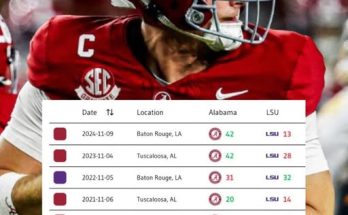The murmur that had followed Arch Manning from the moment he first gripped a football, a low and persistent hum of expectation, has finally been drowned out. It has been replaced by the crisp, definitive sound of a football spiraling through the air, the roar of a capacity crowd, and now, the official recognition from the most competitive conference in college football. The name Manning, synonymous with quarterbacking royalty, is being carved into the Longhorn legacy not by pedigree, but by performance. In a commanding display against the Vanderbilt Commodores, Arch Manning didn’t just play a game; he authored a statement, a 328-yard, three-touchdown masterpiece that announced his arrival not as a prospect, but as a premier SEC quarterback.
For much of his early tenure in Austin, the narrative surrounding Arch was one of patient waiting. He was the heir apparent, the five-star phenom learning behind Quinn Ewers, absorbing the complexities of the Texas offense away from the blinding glare of the starting role. There was an unspoken pressure, a weight that comes with a name that carries the gravitas of Peyton and Eli. Every completed pass in mop-up duty was dissected, every practice report was scrutinized. Was he living up to the hype? Was he the future? The questions were constant, a relentless echo of his famous last name. Yet, within the confines of the program, a different story was unfolding. It was a story of quiet dedication, of a young man determined to be defined not by his lineage, but by his own work ethic and football acumen.
The transition from coveted backup to starting quarterback, when it came, was seamless in its execution but profound in its implications. The offense, once his to observe, was now his to command. And against Vanderbilt, that command was absolute. The stat line itself is a thing of beauty: 25 completions on 33 attempts, a 75% completion rate that speaks to a surgeon’s precision rather than a game manager’s caution. The 328 yards were not accumulated through frantic, desperate heaves; they were built methodically, a testament to a quarterback who sees the field with a veteran’s clarity. This was not a player relying on raw talent alone; this was a conductor orchestrating an 11-man symphony.
What was most striking about Manning’s performance was the palpable sense of comfort. This was the elusive “it” factor that scouts talk about, the feeling of a player who is no longer thinking but reacting, whose instincts have fully merged with the playbook. In the pocket, his footwork was calm and assured. When pressure loomed, he didn’t panic; he navigated, subtly sidestepping rushers to maintain his platform, his eyes perpetually downfield, scanning for the opportunity. This poise is the bedrock of great quarterbacking, and it’s a trait that cannot be taught. It’s bred from countless hours of film study and an innate understanding of leverage, timing, and spatial awareness. He looked, for all the world, like a player who had been the starter for three years, not three games.
The three touchdown passes were each a lesson in a different aspect of quarterbacking excellence. The first, a perfectly placed ball on a deep post route, showcased his arm strength and trust in his receiver to win a one-on-one battle. The throw wasn’t just accurate; it was thrown with the ideal velocity and trajectory, arriving just as the receiver broke away from the defensive back. The second touchdown likely demonstrated his touch and timing, perhaps a well-executed corner route or a seam pass into a tight window, requiring the quarterback to lead his target away from trailing defenders. The third might have been a display of his football intelligence—a quick-hitting red-zone throw, a check-down to a running back out of the backfield, or a savvy recognition of a blitz that left a receiver uncovered. Each score peeled back another layer of a complete and maturing quarterback.
This explosion onto the scene is not an isolated incident. It is the culmination of a process, the visible fruit of a tree that has been carefully cultivated beneath the soil. Since stepping into the starting role, Manning has shown incremental improvement each week, his confidence growing in direct correlation with his reps. The game is slowing down for him. Defensive coverages that might have been a blur of motion and color are now decipherable codes. The complex blitz packages that define SEC defenses are being identified pre-snap, allowing him to adjust protections and find the hot read. He is hitting his stride in Austin, and the stride is a long, confident one that is covering ground in a hurry. The raw tools were never in question—the arm talent, the prototypical size, the athleticism. What we are witnessing now is the refinement of those tools into a precise and devastating instrument.
The significance of earning SEC recognition cannot be overstated. This is not a ceremonial honor; it is an acknowledgment from the conference itself that a new force has entered the fray. The SEC is a weekly gauntlet, a league defined by ferocious defensive lines, future NFL defensive backs, and defensive coordinators who make a living out of confusing young quarterbacks. To be singled out for praise in this environment is to have passed one of the most rigorous tests in the sport. It validates the performance not as a fluke against an inferior opponent, but as a display of skill that meets the conference’s gold standard. It places Arch Manning squarely in the conversation with the conference’s other elite signal-callers, a peer rather than a pupil.
For the Texas Longhorns, Manning’s ascendancy is the final piece of the puzzle in their return to national prominence. The program has long had the talent, the facilities, and the fanbase to compete at the highest level. What it has often lacked in the modern era is the transcendent, game-changing quarterback who can elevate the entire team. In Arch Manning, they have found that player. He is the catalyst that makes the entire offense more potent, the rising tide that lifts all ships. His ability to stretch the field vertically opens up running lanes. His accuracy on intermediate routes keeps drives alive. His command of the huddle instills a belief in the ten other players on the field that, no matter the situation, they have a chance.
The journey is far from over, of course. The schedule will get tougher; the defenses will get faster and more complex. There will be adversity, moments of struggle that are an inevitable part of any quarterback’s career. But the performance against Vanderbilt was a watershed moment. It was the day the potential was actualized, the day the blueprint became a building. The shadow of a legendary name will always be there, but Arch Manning is now casting his own considerable shadow on the field. He is no longer just a Manning; he is the quarterback of the Texas Longhorns, an SEC standout, and a player whose future, suddenly and emphatically, is now. The murmur has ceased. In its place is the clear, resonant sound of a star arriving, and the college football world is listening.



